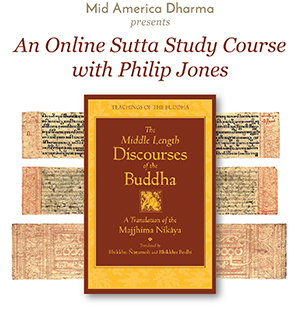
Like many of you, I have been in book groups off and on for many years. I liked some of the books, and disliked others; some interested me and others lost my interest quickly. But I’ve never been in a book group like the one I joined recently — Phil Jones’ Sutta Study group. The book that the group dives into is “The Middle Length Discourses of the Buddha, A Translation of the Majjhima Nikaya” Translated by Bhikkhu Nanamoli and Bhikkhu Bodhi. I was initially very reluctant to take that high dive. My first reaction was my fear of ignorance, of not knowing enough to participate in a discussion or not understanding the texts. But I was eventually persuaded to take a chance and to approach the class with openness and curiosity. (Plus I was assured that Phil would “explain it all”!). I made a significant discovery (actually a re-discovery) through only a couple of classes — I have a strong attachment to a self that “knows.” This has been a recurrent theme since my retirement two years ago from 40 plus years in special education where my “self” as an “expert” in my field was strengthened — and hardened.
Going on retreats, being in sanghas, and studying all aspects of Buddhism has gradually softened and untied the tangled knot of that particular “self.” (Other aspects still under de-construction.).
An article in Tricycle magazine came along early in the study in June 2021 by Kaia Fischer on “How to read the Sutras (and Enjoy Yourself)”. How timely and appropriate! I frequently remind myself of her often humorous “tips” to reading the suttas, such as reading them in small sections, re-reading, reading slowly, being aware of my expectations, trying to identify with each person in the story and consider their perspective, exploring an application of the teaching to my experiences and stopping when I’m still having fun instead of “powering through.”
As we moved through the suttas, the unknown terms became new ones for familiar concepts. The translators’ notes, which were sometimes twice the length of the suttas themselves, were of immense help in understanding subtle meanings of vocabulary, phrases and stories. I enjoyed learning the background stories of the time period, setting, situations, and culture. For example, the personal “rank” of each monk was measured by how many “rainy seasons” they had participated in because the lengthy three-month retreats took place during monsoon weather.
Deepening my understanding of the Buddha himself through these stories expanded my appreciation for his ability to “read” the crowd, especially their feelings and thoughts.
For example, in one sutta, he perceived that the monks were becoming a little too attached to the honor they were receiving from other people. As such he directed his words toward what one should do to become, not an “heir in material gains,” but one of his “heirs in Dhamma,” which turned out to be a prelude to the Noble Eight Fold Path! Fascinating!
As one who experiences anxiety, I looked forward to sutta number four: “Fear and Dread,” and it was reassuring to find that the Buddha himself had these same feelings before his enlightenment. “Subduing” these feelings involved familiar and do-able tasks: stay with the feeling, remain in the body, and “unremitting mindfulness.” Simple, but not easy. I was particularly struck by references to the Buddha’s deep love, wishes for the happiness of his followers (and all beings) and deep compassion for “future generations.”
The following quote touched my heart: “ ‘A being not subject to delusion has appeared in the world for the welfare and happiness of many, out of compassion for the world, for the good, welfare, and happiness of gods and humans,’ it is of me indeed that rightly speaking this should be said.” This is personal – we are the future generations he spoke of.
Although many portions of the texts remain a mystery to me, I have been reassured by Phil that a full understanding of the texts is not “required,” only an openness to the ideas presented. I look forward to future suttas, especially ones with tantalizing titles such as “The Many Kinds of Feeling,” “The Ant-hill,” and “The Simile of the Elephant’s Footprint.”
The Sutta Study has become part of my “practice” which I approach now with enjoyment. The readings and insight from Phil and other group members (most of whom are far more knowledgeable about Buddhist insights than I am), provide me with on-the-spot “training” in my growth as a practitioner. These include reminders of my aversion to what I don’t know, my attachment to being “one who knows,” a continuous application of “more mindfulness,” a need to remain curious and open, and deep gratitude to the Buddha for his compassion and teachings, the insight I am gaining from the Dharma and sincere appreciation for this Sutta Study Sangha. Join us! You might even enjoy it!
Nanette Ford is a practitioner of Insight Meditation. She is active in dharma groups. She is a co leader of the Metta Group of St. Louis.
.